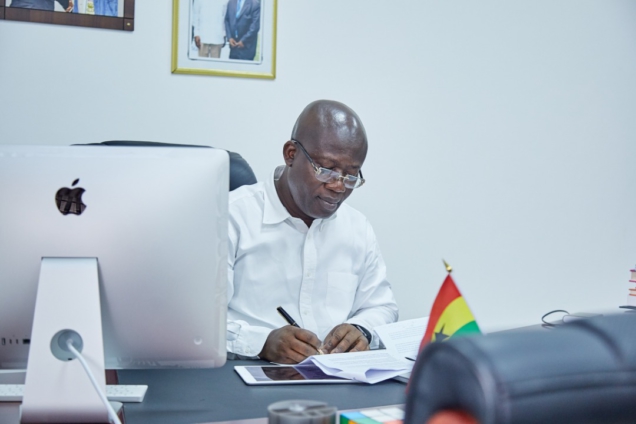The Founding Director of the West Africa Center for Crop Improvement (WACCI) at the University of Ghana says the “Ghana Beyond Aid” agenda rolled out by government will not be successful without the transformation of the country’s food systems.
Prof. Eric Danquah says there is a need for government to make agriculture the springboard for the socio-economic development of the country.
“Let me first say that a ‘Ghana Beyond Aid’ agenda not underpinned by transformation of our food systems is dead on arrival,” he said at the opening of a virtual forum organized by WACCI as part of the United Nations’ Food Systems Summit 2021 independent dialogues.
"The dialogue under the theme agricultural innovations and interventions for food systems transformation in Ghana aimed at soliciting inputs on how the country’s food systems can be sustainably transformed between now and 2030.
“We know too well that food systems are in many cases part of the problem, but there is agreement that transforming food systems is one of the most powerful ways to change course, realize the vision of the 2030 Agenda and support the Secretary-General’s call to “build back better” from Covid-19,” he observed.
“There is consensus that a major redesign in food systems is needed to achieve food and nutrition security, but we have not done much to transform food systems,” he said.
“A country like Ghana, which spent about $2.5 billion on food imports in 2019 alone, should be distraught. Furthermore, a country that imports seed for farmers at the start of every planting season should rethink its developmental strategy…But, unfortunately, we do not have any choice if we want to improve the human condition in Ghana. Therefore, we need to prioritise investments in agriculture,” Prof. Danquah told the forum.
He commended the Ministry of Food and Agriculture for introducing the Planting for Food and Jobs (PFJ) programme. He said the PFJ was a major development in the agricultural development space but called for more to ensure a sustainable impact.
“We can use local solutions to address the challenges of our agriculture and free ourselves from over-dependence on the outside world… Meeting the challenge will inevitably be disruptive to current food systems, carry costs and will be politically onerous. That is why we need political will at present than ever because solutions are needed in nine years,” he noted.
“How long should a nation take to put in place a national research and innovation agenda at a time that women and children are dying of hunger and poverty, which have killed or disrupted the lives of more people in the country over the past year than Covid-19? How I wished hunger was a communicable disease, but how could it…it would have been solved long ago,” Prof. Danquah observed.
“Perhaps, the day should come when the neglect of the use of modern science for agricultural development by governments globally is considered a crime against humanity,” he added.
Prof. Marian Quain who is Deputy Director of the Crop Research Institute of the Council for Scientific and Industrial Research (CSIR) said with the world population increasing, “much more effort and innovation will be urgently needed in order to sustain food production, improve the global supply chain, decrease food losses and waste, and ensure that all who are suffering from hunger and malnutrition have access to nutritious foods.”
Prof. Irene Egyir of the Department of Agricultural Economics at the University of Ghana said there was the need for increased investments in effective delivery systems for food including road and rail network, storage and processing facilities, local assembly, agrochemicals and machines, seed, digital solutions as well as research and innovation. “We are in the era of infrastructure. We need some improvement,” she said.
Prof. Daniel Bruce Sarpong who is Dean of the School of Agriculture at the University of Ghana called for better collaborations and partnerships to improve the country’s food systems.
“I think with the food systems, we need to understand that it’s a structure and has building blocks that are required in this transformation. We need the various building blocks and stakeholders and their networks. Civil Society, private institutes, research organizations.
“For a sustained food system transformation, we need to move away from individual thinking to internalizing our strengths, opportunities and share experiences in achieving a food system that is sustainable and meets our needs,” he added.
Dr. David Botchie who is a lecturer at the Brunel University in the United Kingdom said there was the need to take advantage of digital technology to improve food systems.
“There are a lot of technologies that have been developed by the youth. What kind of systems can be put in place to bring such technologies beyond the radar to transform the food systems?” he asked.
Latest Stories
-
CLOGSAG vows to resist partisan appointments in Civil, Local Government Service
36 minutes -
Peasant Farmers Association welcomes Mahama’s move to rename Agric Ministry
38 minutes -
NDC grateful to chiefs, people of Bono Region -Asiedu Nketia
40 minutes -
Ban on smoking in public: FDA engages food service establishments on compliance
41 minutes -
Mahama’s administration to consider opening Ghana’s Mission in Budapest
43 minutes -
GEPA commits to building robust systems that empower MSMEs
45 minutes -
Twifo Atti-Morkwa poultry farmers in distress due to high cost of feed
47 minutes -
Central Region PURC assures residents of constant water, power supply during yuletide
48 minutes -
Election victory not licence to misbehave – Police to youth
50 minutes -
GPL 2024/2025: Nations thrash struggling Legon Cities
53 minutes -
Electoral offences have no expiry date, accountability is inevitable – Fifi Kwetey
53 minutes -
Ghanaians to enjoy reliable electricity this Christmas – ECG promises
1 hour -
Police deny reports of election-related violence in Nsawam Adoagyiri
1 hour -
‘We’re not brothers; we’ll show you where power lies’ – Dafeamekpor to Afenyo-Markin
1 hour -
EPA says lead-based paints are dangerous to health, calls for safer alternatives
3 hours

